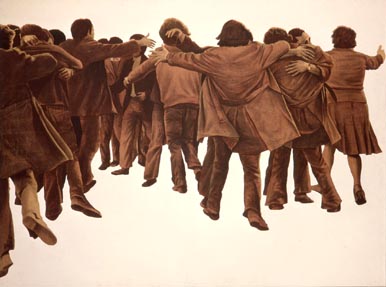Farewell
If I die,
leave the balcony open.
The little boy is eating oranges.
(From my balcony I can see him.)
The reaper is harvesting the wheat.
(From my balcony I can hear him.)
If I die,
leave the balcony open!


I like a book to open outward. The more personal and particular poems tend to come at the beginning of my books, and the more public and larger poems toward the end. I think our lives do this , if we are lucky. At the start, we are more self-absorbed, and as time goes on, hopefully we become more and more aware of the people and voices and animals and things around us. We want to open up, like flowers. And our books ought to do the same.This made me think about my own manuscript. It doesn't open outward in that sense. From the very beginning, it's mostly self-absorbed and outwardly drawn at the same time. Which, I think, is an apt way to talk about my life's journey too. I had laid claim to an "outward" life much before I tried to move inwards. Or rather, before I tried to find a relationship between the outward life I was drawn to and living-- ideologies, student organizations, little magazines, cultural and political collectivities, institutional structures--and me myself and my inner life. Consequently, a big part of my early youth was spent trying to write "political" poems. Which translates to, writing about people, places and times I knew nothing about, except as these abstract representations jumping on to me from pamphlets, manifestoes and books. There came a time, and it came pretty quickly too, when I couldn't keep on writing them. The political life I was living was too complex, the collective political activities I was participating in were too full of contradictions. I needed a different language to talk about them. And I could no longer afford to try to write "political" poems in that way. This was the time when I wrote some poems exploring my life as a young woman who was trying to find her space within leftist social movements and ideologies in an age when History had been proclaimed to come to an end (am I too old to remember that moment?), and my elders seemed to be too deficient in explaining these political realities in the language they have always spoken. For a long time, I didn't write at all. Except those on demand. And they were mostly "non-creative." I didn't know, again, how to find myself, how to experience my coming-of-age as a leftist when the Global Left was going through momentous defeats. I didn't know how to find that interrelationship between inward and outward. It is finding that relationship that now I call coming to voice. Not that one's quest for a voice ever ends, but I would say, it was the beginning of that process of finding my own voice. For me, it has been a lengthy, difficult and tricky process. I don't expect it to be otherwise.

